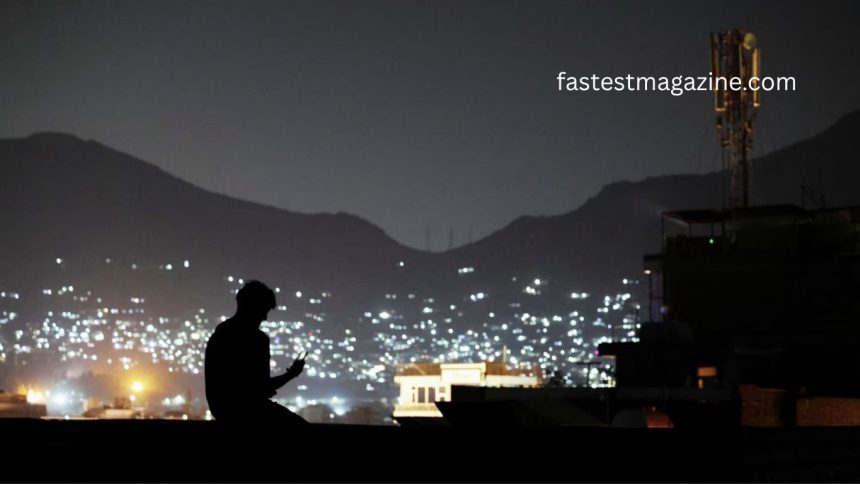For 48 hours, Afghanistan was plunged into digital darkness. The Taliban regime ordered a nationwide shutdown of internet and phone networks, cutting off more than 40 million people from the outside world.
The sudden blackout froze communication, banking, and trade, and sparked global alarm as families, journalists, and aid organizations lost all contact with those inside the country.
Flights were canceled, businesses stopped operating, and panic spread as Afghans found themselves isolated once again. “It felt like the country had gone back in time,” said Kabul-based journalist Hewad Watander. “People’s hope vanished. Their spirits were broken.”
The shutdown, which began late Monday and ended abruptly two days later, came without warning. While Taliban officials offered no clear explanation, most observers saw it as another attempt to control information and silence dissent.
Read More: https://fastestmagazine.com/cambricons-brilliant-ascent/
A Nation Disconnected
In recent years, the internet has become Afghanistan’s primary link to the global community — especially for women and youth denied education and employment. The blackout exposed how dependent Afghans have become on connectivity for survival, education, and communication.

For many, the loss was deeply personal. Families were left in agony, unable to reach loved ones abroad.
“I couldn’t sleep for two nights,” said Fatima Yousufi, a former Afghan soccer player now living in Australia. “My aunt in Kabul relies on money we send to feed her children, but there was no way to reach her.”
Students, teachers, and activists also suffered. Mati Amin, co-founder of SOLAx, an online education platform for Afghan women, reported a “precipitous drop” in lesson requests. “Every single province was affected,” he said. “Girls who depend on digital learning suddenly found their classrooms gone.”
Even radio stations were silenced. Hamida Aman, founder of Radio Begum, confirmed that all local broadcasts were cut off. “Only satellite TV from abroad kept us connected to the world,” she said.
Economic Paralysis and Widespread Panic
The internet outage did more than mute voices — it crippled Afghanistan’s fragile economy.
TOLO News reported massive disruptions: ATMs stopped working, online payments failed, and importers couldn’t reach suppliers.
Abdul Hamid, a money exchanger in Kabul, spent hours traveling across the city to check exchange rates manually. “The next day, I didn’t even open my shop,” he said. “What’s the point of working when there’s no connection?”
Businesses dependent on online communication were forced to shut down. Trade with Pakistan, a major economic partner, stalled as cross-border coordination collapsed. “I couldn’t reach suppliers or track shipments,” said Sabir Shah, a fruit trader in Peshawar. “The Taliban must understand — the internet isn’t a luxury. It’s a lifeline.”
The blackout also highlighted Afghanistan’s economic fragility. Years of sanctions, drought, and mass refugee returns have already devastated livelihoods. UN envoy Richard Bennett warned that the shutdown “could further sink the fragile economy and trigger human rights consequences.”
Voices of Desperation and Defiance
As the blackout stretched into a second day, fear turned to frustration. Many Afghans described the eerie silence of phones and the helplessness of not being able to reach even neighbors. “It’s strange to live without your phone,” said Kabul teacher Maimoona Durani. “No calls, no texts — it felt like we were buried alive.”
For women, the impact was particularly severe. Since 2021, the Taliban has banned most girls from education beyond sixth grade and prohibited women from working in many sectors.
Online platforms had become a rare space for learning and self-expression.
“The internet is our only window to the world,” said a 19-year-old student named Samira. When service was finally restored, she recalled, “Everyone’s faces lit up. People ran home to reconnect with their families.”
Kabul housewife Fawzia Rahimi shared her emotional reunion with her daughters abroad. “When the messages came through, I cried,” she said. “Hearing their voices was the happiest moment in days.”
But beneath the relief lies anger — anger that such disconnection can be imposed so easily. “Taking away communication is taking away life itself,” Rahimi said.
Information Control and Fear of the Past
Analysts say the Taliban’s decision may have been driven by fear of digital influence. Before the nationwide cutoff, northern provinces had already reported regional internet restrictions “to prevent immoral activities.”
The orders reportedly came from Taliban Supreme Leader Mawlawi Haibatullah Akhundzada, a reclusive figure who rules from Kandahar.
Observers warn the blackout is part of a broader strategy to tighten control and limit exposure to outside ideas. “The more they isolate Afghanistan, the freer they are to act without witnesses,” said former lawmaker Mariam Solaimankhil, now in exile. “If someone is punished or killed, there’s no proof, no video, no record.”
Indeed, the absence of information creates dangerous silence. Human Rights Watch’s Sahar Fetrat said Afghans told her the experience “felt like living 30 years in the past.” For young girls especially, losing internet access meant losing their last connection to education — and hope.
Global Reaction and Digital Resistance
Global rights organizations and the United Nations swiftly condemned the blackout, urging immediate restoration of communication.
Meanwhile, reports surfaced of Afghans turning to Elon Musk’s Starlink satellite network for emergency connections. Though officially unavailable in Afghanistan, some users reportedly accessed it through neighboring regions.
However, experts warned of the risks. “Owning a satellite unit could endanger citizens under Taliban control,” said Tom Worthington of the Australian National University. “It’s effective for resistance movements, but perilous for ordinary people.”
When the order to reconnect finally came, data traffic spiked to record levels. Network analyst Doug Madory from Kentik described the shutdown as a “wholesale disconnection” — similar to the 2011 Egyptian blackout during the Arab Spring. “These acts damage the government’s own operations and economy,” he said. “They’re unsustainable.”
Even some Taliban ministers reportedly opposed the move. Former U.S. Ambassador Zalmay Khalilzad wrote that several officials were “dumbfounded,” suggesting the leadership didn’t fully grasp the consequences.
Digital Power, Human Rights, and the Future
The internet blackout underscored a harsh truth: in today’s world, cutting communication means cutting freedom.
For Afghans — especially women, students, and journalists — connectivity is not merely a convenience. It’s a tool of survival, expression, and resistance.
Artist and educator Nigin, from northern Afghanistan, captured the spirit of defiance in an essay for Usawa Magazine. When her connection failed, she walked door to door to check on her students, leaving behind messages of perseverance. “Wherever I went, I said: We continue,” she wrote. “Either death or hope.”
Her words reflect the resolve of millions who refuse to surrender to silence. Despite restrictions, Afghans continue finding creative ways to connect — through VPNs, satellite links, and underground networks — determined to keep their voices alive.

Frequently Asked Questions:
What caused Afghanistan’s two-day internet blackout?
The Taliban ordered a nationwide shutdown of internet and phone networks, disconnecting more than 40 million people. While no official reason was given, many believe it was an attempt to restrict communication and control information flow within the country.
How long did the internet blackout last in Afghanistan?
The blackout lasted for approximately 48 hours, beginning late Monday evening and ending on Wednesday. During this period, almost all digital and mobile communication services were completely disabled.
How did the blackout affect daily life in Afghanistan?
The shutdown brought normal life to a halt. Banks, businesses, schools, and aid organizations were unable to operate. Online transactions failed, communication lines collapsed, and citizens were left isolated from friends, family, and the outside world.
Why is the internet so important for Afghans, especially women?
For Afghan women and girls—many of whom are banned from education and work—the internet is a lifeline. It allows them to access online classes, connect with teachers, and communicate with the global community. The blackout stripped them of their only remaining space for learning and expression.
What was the global reaction to the Taliban’s internet shutdown?
The United Nations, Human Rights Watch, and Amnesty International condemned the move, calling it a violation of human rights and digital freedom. They urged the Taliban to immediately restore connectivity and protect citizens’ access to information.
Did the Taliban explain why they cut off the internet?
No clear explanation was provided. However, local Taliban officials previously mentioned shutting down internet access in northern provinces to prevent “immoral activities.” Analysts suggest the nationwide blackout was likely a test of control or an effort to suppress dissent.
How did the blackout impact Afghanistan’s economy?
The shutdown caused massive economic disruption. ATMs stopped working, trade with Pakistan was delayed, and small businesses suffered severe losses. Many Afghans were unable to withdraw money or make online payments, deepening financial instability.
Conclusion
Afghanistan’s two-day internet blackout was more than a communication failure—it was a stark reminder of how fragile freedom remains under the Taliban’s rule. The shutdown exposed the regime’s fear of an informed population and its willingness to isolate millions to maintain control. Yet, it also revealed the resilience of the Afghan people. Despite being cut off, Afghans refused to surrender to silence. From students seeking education online to families desperate to reconnect, their determination proved that progress cannot be erased by force. In today’s digital age, connectivity is not a privilege—it is a human right, a bridge to education, opportunity, and hope.














